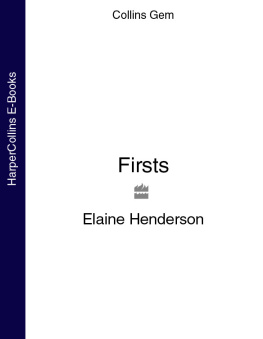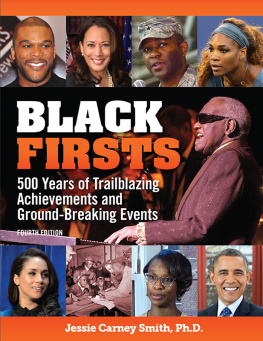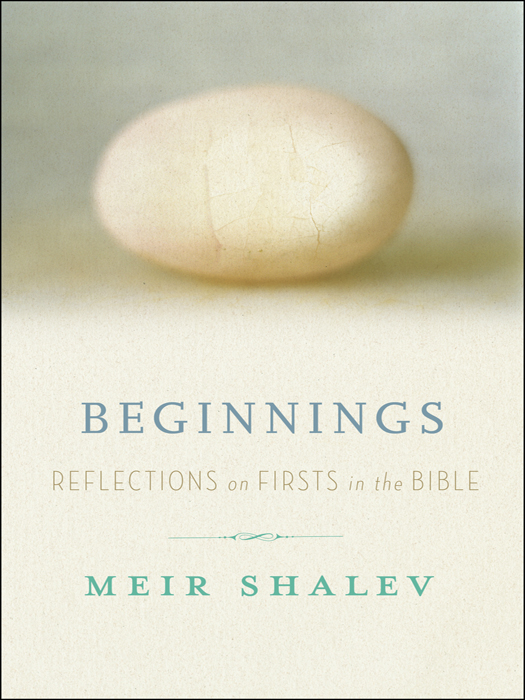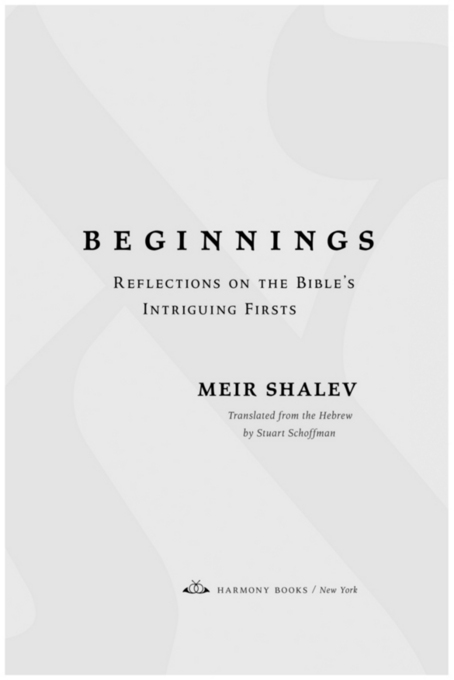Copyright 2011 by Meir Shalev
All rights reserved.
Published in the United States by Harmony Books, an imprint of the Crown Publishing Group, a division of Random House, Inc., New York.
www.crownpublishing.com
HARMONY BOOKS is a registered trademark and the Harmony Books colophon is a registered trademark of Random House, Inc.
Biblical quotations that appear in Beginnings are based on the following translation sources:
The Torah: The Five Books of Moses (Philadelphia: Jewish Publication Society, 1962); The Prophets: Neviim (Philadelphia: Jewish Publication Society, 1978); The Writings: Kethubim (Philadelphia: Jewish Publication Society, 1982). All rights reserved
The Tanach, translation copyright D. Mandel. Found on Davka Judaic Classics CD. All right reserved.
New Revised Standard Version Bible, copyright 1989, Division of Christian Education of the National Council of the Churches of Christ in the United States of America. Used by permission. All rights reserved.
Library of Congress Cataloging-in-Publication Data
Shalev, Meir.
[Bereshit. English.]
Beginnings : reflections on the Bibles intriguing firsts / Meir Shalev ; translated from the Hebrew by Stuart Schoffman. 1st ed.
p. cm.
1. Bible. O.T.Criticism, interpretation, etc. I. Schoffman, Stuart. II. Title.
BS1158.H4S44513 2011
221.6dc22 2010020266
eISBN: 978-0-307-71719-1
Jacket design by Jessie Sayward Bright
v3.1
Contents
Introduction
T he book of Genesis, true to its name, describes the beginnings of things. Though the Bible speaks in such terms only about the creation of the world, it also portrays the first love, the first death, the first laugh, the first dream, and tells too of the people who were chosen to do things first: to give birth, to hate, to deceive; to be the first musician, king, blacksmith, or spy.
These firsts are often surprising. The first death in the Bible, for example, is not of natural causes. The first crying is not of a newborn baby or of a bereaved parent or an unrequited lover. The first dream in the Bible is not dreamt by an important figure in the history of the Jews, but rather by an utterly marginal king of the Philistines. The first kiss is not a lovers kiss but a fathers test of his son, spurred by suspicion. And the first appearance in the Bible of the Hebrew word for love is not about the love of a man for a woman, or a woman for a man, or a mother for her son. The first love was a fathers love.
This is a book of biblical firsts, each of which gives rise to further occurrences. In writing it I kept faithful to a self-imposed rule: each of these cases has to be explicitly designated. The first love and first hatred, for example, could not be derived from an interpretation of the stories. The words love and hate had to appear in the text.
This is my second book about the Bible. The first was called Bible Now, and, again now as then, I neither wish nor pretend to furnish a substitute for reading the Bible itself. I urge readers to go back to the original and make new discoveriesabout themselves as well.
THE FIRST LOVE
O nce I happened to visit a fishing village in the Andaman Sea, west of the Malay Peninsula in the Indian Ocean. Unlike typical fishing villages, this one was not situated onshore, but floated in the sea. Its houses were built on rafts that were anchored side by side and connected with ropes and wooden walkways.
The village rocked tranquilly upon the waves, up and down, creating a strange sensation. In general, when you go from a boat to a dock, you feel at once the reassuring solidity of the shore, whereas here I went from one rocking to another.
The villagers were Muslims, Malay fishermen. I walked among their houses until I came upon a half-opened door beyond which sat a thin, wiry man. We exchanged glances and the man smiled and invited me in with a wave of his hand. We drank tea. On the wall were a photograph and a drawing. The photo was some sort of European landscapegreen valleys, reddish brown cows, waterfalls, snow-covered mountains. The drawing was readily identifiable: a young lad lying upon an altar, an old man brandishing a knife over him, an angel hovering overhead, and in the background the ram, its horns caught in the bush.
For a moment I thought I had stumbled upon one of the Ten Lost Tribes, and in my mind I began to compose letters to the Chief Rabbinate and the Jewish Agency, urging that these people be airlifted to Israel. But before throwing my arms around my long-lost brother, I asked him what was depicted in the drawing. The man pointed at the old man with the knife and pronounced, with an unfamiliar lilt: Ibrahim. He then pointed to the lad and said: Ismail. I knew different, yet said nothing. When I got back to Jerusalem, I checked and discovered that indeed, according to some interpreters of the Quran, it was Ishmael and not Isaac whom God had ordered Abraham to sacrifice. I report this with a degree of embarrassment. I should have known this all along.
Instead of the requisite amazement I felt sorrow. The Israeli-Arab conflict, I realized, isnt only about land or holy places. Its a dispute over something more difficult: love. Specifically, a fathers love. And to make things even more complicated, this is not love that is expressed in the gift of a coat of many colors, or by a better blessing, but rather in the very worst act to be found in the book of Genesisthe binding of Isaac. It is written in the Bible: Take your son, your favored one, Isaac, whom you love, and offer him as a burnt offering. Its a bit hard for the heirs of Ishmael to see the name Isaac attached to the words your favorite son, whom you love.
Ishmael and Isaac themselves, by the way, were not rivals. Certainly not like Cain and Abel, Jacob and Esau, Joseph and his brothers. The real rivalry in the family was between the two mothers, Sarah and her maidservant Hagar. The notion that two separate religions would someday spring from Ishmael and Isaac was as yet unknown. But when God said your favored one, whom you love about IsaacIshmael and his mother having been banished from Abrahams housethe emotional basis for the problem that afflicts us to this day was set in place.
But theres more: This whom you love is the first appearance of love in the Bible. Two points are of interest. First, that this is the love of a man for his son, not his wife. That will come second, in the love of Isaac for Rebecca. Moreover, here we have a fathers love, not a mothers. The first case of motherly love will be the third instance in the Biblethe love of Rebecca for her son Jacob. Then too there is discrimination between brothers: Rebecca loves Jacob, Isaac loves Esau.
Two oddities: From a literary and societal point of view, and a legal standpoint as well, a mothers love is thought to be greater than a fathers. As for love between man and wife, modern literature ranks it higher than the love of parents for their children, and indeed in the natural order of things it comes firstfor without it, thered be no children to love them in return. But the Bible favors the family, and in this case, the family that will become a nation. Thus Abrahams love for Isaac is put in first place. The love of a parent for a daughter, incidentally, is never mentioned in the Bible at all.













